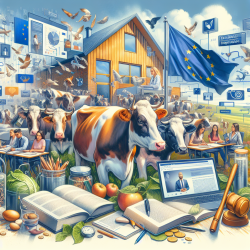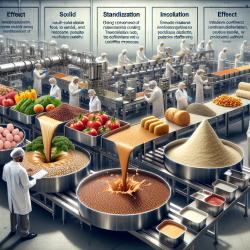Introduction
The European Union (EU) has implemented specific regulations for organic dairy farming aimed at promoting high animal welfare standards. However, a critical review of these regulations reveals both improvements and gaps in their effectiveness. This blog post will explore how practitioners can enhance their skills by implementing the research findings from the article "Organic Dairy Cattle: Do European Union Regulations Promote Animal Welfare?" and encourage further research in this area.
Key Findings from the Research
The research article highlights several areas where EU organic regulations have improved animal welfare compared to conventional farming. These include:
- Greater emphasis on natural living conditions for dairy cattle.
- Ban on some physical mutilations, such as tail-docking.
- Clearer recommendations for housing conditions that support the animals' developmental, physiological, and ethological needs.
Despite these improvements, the regulations are often conveyed using vague language, provide exceptions, or remain silent on some aspects. This can limit their effectiveness in promoting high standards of animal welfare.
Implementing Research Findings
Practitioners can improve their skills by implementing the research findings in the following ways:
- Enhance Housing Conditions: Ensure that housing conditions meet the developmental and physiological needs of dairy cattle. This includes providing ample space, comfortable bedding, and opportunities for social interaction.
- Promote Natural Behaviors: Allow dairy cattle to express natural behaviors by providing access to pasture and minimizing confinement.
- Pain Mitigation Strategies: Implement pain mitigation strategies for procedures like disbudding and dehorning to minimize animal suffering.
Encouraging Further Research
While the research provides valuable insights, there is still much to learn about the effectiveness of EU regulations in promoting animal welfare. Practitioners are encouraged to engage in further research to explore:
- The impact of specific housing conditions on animal welfare.
- Alternative methods for pain management during routine procedures.
- The long-term effects of organic farming practices on animal health and well-being.
Conclusion
The EU organic regulations have made strides in promoting animal welfare, but there is still room for improvement. By implementing research findings and engaging in further research, practitioners can contribute to enhancing the welfare of dairy cattle. To read the original research paper, please follow this link: Organic Dairy Cattle: Do European Union Regulations Promote Animal Welfare?










